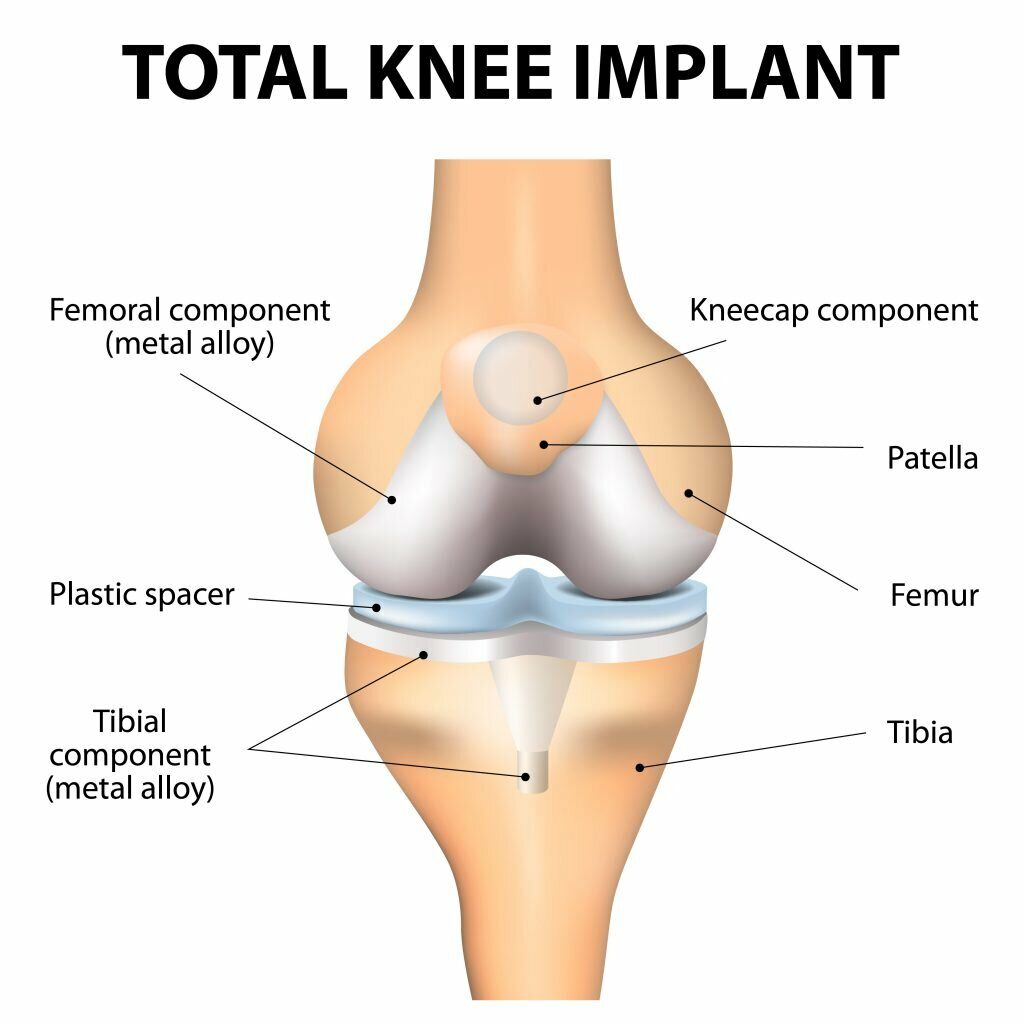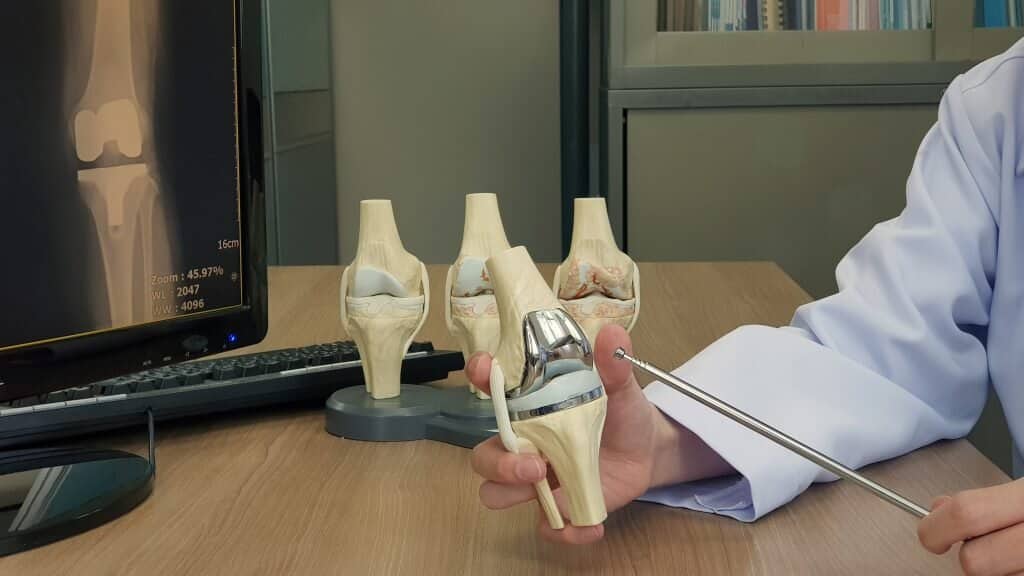
Choosing the right knee replacement implant is like choosing an insurance policy. There are an overwhelmingly large number of options to choose from each at a different price point, with different features and benefits. It becomes even more confusing when you approach insurance agents as each of them highly recommend a certain type of insurance and you know they are selling it because they make good money on it! However, the fact is that somewhere out there, there is an insurance policy which is just right for you in terms of your needs and affordability.
Similarly, in the vast ocean of knee implant options available, there is one which is the most suitable for you, which will help you lead a happier, healthier lifestyle. This article will take you help you find that one life altering implant.
Before understanding the types of implants available, you should know…
What exactly gets replaced during a total knee replacement surgery?
In a total knee replacement, there are 3 components of your knee which are replaced with implants.

The femoral component: This is the part that attaches to the thigh bone. It is curved in shape and is the biggest component in terms of size.
The spacer: Between the femoral and tibial component, a spacer is fit in. The spacer provides flexibility to the knee joint and helps in bending and flexing the knee.
The tibial component: This is a flat component which replaces the top part of the shin bone. It has a groove which allows the kneecap to move up and down when the knee joint is bent and straightened.
The patellar component: Required only on a case to case basis, it is a dome shaped component which replaces the kneecap.
Now, all these implant components are categorized based on the material used, the kind of flexibility they offer, the material used to hold the implants together and based on brands.
Seems overwhelming, right? Let’s take a look at them one at a time.
Implants based on material
The most commonly used implants are made of metal alloys, ceramic or plastic.
Metal alloy Implants: These implants are made of metals like Cobalt-Chromium or Titanium. They are biocompatible and durable. However, these are best avoided if you have metal skin allergies. Conveying to your doctor about the allergies is extremely important. Some experienced surgeons also use ‘gold knee implants’. This implant can be safely used for people who have metal allergies.
Ceramic Implants: These implants provide a natural feel to the knee joint after replacement. The wear and tear of a ceramic joint is minimal as compared to a metal one. However, there is a risk of breaking of the ceramic if the knee suffers a forceful impact. If this happens, immediate surgery will be required to remove the broken ceramic pieces.
Plastic or Polyethylene Implants: Using plastic implants might be the cheapest option available in the market today. They work best when used along with a metal component. However, these can trigger an immune reaction causing failure of the surgery.
Implants based on design
Fixed bearing Implants: Most of the knee replacements are fixed bearing ones. They don’t provide much flexibility. They are most suitable for elderly patients who do not have too active a lifestyle. Too much movement can result in wear out as the implants are not that flexible.
Mobile bearing Implants: This kind of a design allows for limited rotation of the knee joint. It has a groove which fixes to the tibial component which helps it twist. This kind of design is best for youngsters and elders who have a physically active lifestyle.
Implants based on affixing material
There are two kinds of techniques involved in fixing the implants to the knee. They are:
Cemented joint: In this case, the implants are fixed to the knee bone using fast drying cement. There is a possibility of breakdown of the cement which can lead to failure of the surgery.
Non-cemented joint: In a surgery involving non-cemented joint, a provision is left for the natural bone to grow. The bone attaches itself to the implant. It’s best used for youngsters whose bones are of good quality and grow faster.
Implants based on brands
There are hundreds of brands of implants available in the market today. Each brand has its own advantages and disadvantages.
Now that you are aware of the different options available for deciding on the implant, let me tell you what you actually need to consider!
The newer the implant the better it is?
No, not really. Rather than deciding on the implant based on how new it is, you should look for data on how successfully the implant has worked. How many years it has been since it’s being used and what’s the success rate. Tried and tested is always better in life changing matters like these, right?
Should I go for customizable, gender specific implants?
Well, again. These might work really well for some people and might not work at all for some. Consider all options but the make a decision based on what your doctor suggests.
The only choice you need to make- The right doctor!
Yes, this is the most important choice you should make. If you have the best doctor at your side, he will inform you about the implants most suitable for you. Also, every implant has specific features which need to be considered during placement. So, ask your doctor to suggest the right implant for you and with which he’s had the most experience.

At Ayu Health, you can be assured that the doctors suggest only the implants which will be best for you in terms of features, flexibility, cost as well as success rate. Our doctors have performed hundreds of knee replacements so far. Choosing Ayu Health means choosing the right doctor and in turn, the right knee implant!
Ayu Health offers all-inclusive fixed price packages for Total / Partial Knee Replacement surgeries. To know more, visit https://ayu.health/bangalore/surgery/bilateral-total-knee-replacement-14, or call us on +91 – 6366 100 800. book an appointment or to know more.
Our Hospital Locations
Orthopaedics Surgery Hospitals in Chandigarh | Orthopaedics Surgery Hospitals in Bangalore | Orthopaedics Surgery Hospitals in Jaipur | Orthopaedics Surgery Hospitals in NCR | Orthopaedics Surgery Hospitals in Hyderabad
Our Doctors
Orthopaedics Surgery Doctors in Chandigarh | Orthopaedics Surgery Doctors in Bangalore | Orthopaedics Surgery Doctors in Jaipur | Orthopaedics Surgery Doctors in NCR | Orthopaedics Surgery Doctors in Hyderabad
About the Author

Dr. Manjunath Kumar K.
Dr. Manjunath Kumar K. is a renowned Orthopaedics currently practicing at Ayu Health, Bangalore.
He is an orthopedic surgeon currently practicing at Mallige Medical Center, Bangalore. A highly qualified doctor, he has completed his MBBS from Bangalore Medical College and MS in Orthopedics from KIMS, Hubli. further higher surgical training was from England, Birmingham. His post-graduate degree from the royal college of Edinburgh and the Royal College of Ireland. He also has vast experience in treating Unilateral Total Knee Replacement, Bilateral Total, Knee Replacement, Total Hip Replacement Surgery, and ACL Tear



